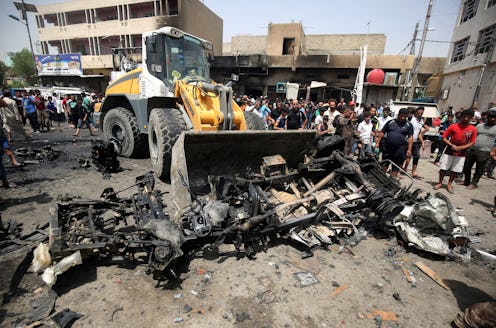News
Was The Baghdad Car Bombing ISIS?
At least 64 people were brutally killed and 86 wounded by a car bomb at a market in a largely Shiite Muslim neighborhood of Baghdad Wednesday. The explosion was one of the Iraqi city's largest terrorist attacks this year, and ISIS quickly claimed responsibility for the Baghdad car bombing as the city grappled with the tragedy. The militant group said on social media that it was targeting Shiite fighters in the neighborhood of Sadr City, although most of those killed were reportedly women and children. Iraqi police said the bomb was placed in a parked car.
The Islamic State controls large parts of Iraq, and also took responsibility for other recent attacks in the country, one of which killed at least two dozen people at a livestock market east of Baghdad. In February, the same neighborhood was targeted by two suicide bombers, leaving at least 70 dead at another busy market. Despite U.S. and Iraqi military efforts against the violent group, Wednesday's bombing signified that ISIS still has the power and resources to pull off large attacks in the country.
"It is well known that whenever there is a military victory against [Islamic State], [they] resort to this criminal, cowardly act by using car bombs or suicide bombers to kill innocent people," Interior Ministry spokesman General Saad Maan toldThe Wall Street Journal. Maan said the authorities are investigating the bombing.
Two other bombs went off in different parts of the city Wednesday, killing six, but ISIS didn't claim responsibility for those as it did the larger attack.
Baghdad began to build a wall around the city in February, meant to keep ISIS from invading the capital, but no expected completion date was given. "The security barrier around Baghdad will prevent terrorists from infiltrating the capital or smuggling explosives and car bombs to target innocent civilians," Baghdad military spokesman Abdul Ameer al-Shammari told BBC in February. The wall would also reportedly be surrounded by a deep trench and include surveillance cameras and explosives detection devices. Some existing walls will be taken down to make way for the new, more comprehensive barrier, but walls around the "Green Zone" of the city that houses the government, parliament, and many embassies will remain as extra protection.
Sadr City, known as "Saddam City" during Saddam Hussein's reign, has consistently been attacked because of its large Shiite population. As a Sunni militant group, ISIS sees Shia beliefs as unorthodox and therefore wrong. Sunni and Shia Muslims have been at odds in Iraq for years, and ISIS has targeted the group in both Iraq and Syria.
